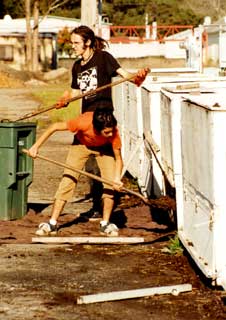|
HOME | SEARCH | ARCHIVE |
|
Close encounters
The fine art of turning
tons of campus food scraps into gardeners' gold
By Cathy Cockrell, Public Affairs
| |
 Berkeley Worms collective members harvest castings at Richmond Field Station. Peg Skorpinski photo.
|
24 Jan 2001 | Worms rule.
That is if you're a member of the non-profit student-run collective "Berkeley Worms," a.k.a. the ASUC Composting Project.
Its mission: gathering mountains of food scraps from campus residence halls, restaurants, sororities and co-ops, and turning them into a marketable nutrition-rich gardening product. "Garbage in, garden out," as the group's logo puts it.
Literally speaking, people don't accomplish this creative repurposing; worms do.
Yet it takes an awesome amount of human footwork, composting expertise, mechanical know-how, administrative effort and physical labor to keep a herd of red wigglers happily munching a diet of discarded broccoli stalks, egg shells, used tea bags, too-old-to-eat casseroles, orange peels and pot scrapings.
Collecting the weekly four-ton mother lode, and monitoring the health and welfare of the worms, are only the most obvious tasks.
At a recent collective meeting, for example, the worms themselves - who feed on scraps in 20 Dumpster-like boxes at Richmond Field Station and excrete rich dark "castings" worth $200 per cubic yard - were reported to be "looking good."
"But there's a complication in box four," reported collective member Moses Wolfenstein. Food scraps, fibrous bedding, organisms micro and macro, and worms sit inside the boxes (built by former collective members) on a polypropylene web. The rope had broken, and the worms et al. were falling through to the bottom, where castings are harvested.
The collective's to-do list went on from there: repairing the tractor, finding gravel for a French drain, rounding up pitchforks, bagging "product" and hawking 10-pound bags of castings at weekend farmers' markets.
One student volunteered to do maintenance on the hydraulic mechanism of Berkeley Worms' one-of-a-kind vehicle - a Ford diesel truck equipped with a hydraulic lifter and a dairy feed mixer, like a giant Cuisinart, which grinds and mixes the scraps to a bilious stew by the time the truck reaches Richmond.
Because the organization operates as a collective, members run the entire show, collecting a rare set of job skills in the process - from balancing the books and developing a marketing plan to scouting for local sources of manure or donning hip boots to make repairs inside the Earth-Tub, a closed vessel that uses billions of heat-producing bacteria, instead of worms, to break down food scraps.
"I was inside the Earth-Tub," environmental studies student Sara Nafici reported at the meeting, resting her knitting needles on her knee as she spoke. "It was funky."
The yuck factor is real.
"You can't be squeamish about dirt, bugs or decomposing things," cautions Wolfenstein. "Anyone who works here gets mentally prepared. But," he adds, "there's no way you could possibly be prepared for how disgusting it is."
Over the summer, Berkeley Worms (and its neighbors at the field station) fought an infestation of flies that had hatched from the used horse bedding being used for composting.
The collective is on the front-edge of large-scale worm farming, or vermiculture - constantly tweaking the ingredients and protocols that affect factors like temperature, acidity and ventilation inside the worm boxes.
If conditions aren't just right, for example, the worms may be invaded by red mites, who suck the blood of the weaker wigglers.
The worms "get deformed in the process," says Berkeley Worms veteran Jon Bauer, who has been with the project since 1995. "It looks like a horrible way to go."
Says Nancy Au, a junior, who acts as the group's treasurer: "When you let a (worm box) lid go, the air goes 'pooh!' I get the mites on me, like shakeoffable pimples."
Yet for all that, job satisfaction is high. Collective members cite, as pluses, the "no boss" factor, eclectic job skills and helping to curb landfill waste and planetary soil depletion.
"I've had many jobs," says Au. "This is the first one that felt worth doing."
Gage Barrager, who describes herself as "a tomboy" and "down for the cause," loves doing physical work, outdoors, near the bay.
"It's beautiful, quiet; the wind smells nice," she said one day recently at the field station, pushing her shovel into a crumbly mound of worm castings. You get used to the odor of garbage, she added. "Now a landfill or a dump would be a terrible smell."
For information on Berkeley Worms, including an online worm-castings ordering form, see www.ocf.berkeley.edu/~compost/ on the Web, or call 643-0440.
"Close Encounters" is an occasional column documenting unofficial moments in campus life. If you have an idea for a column, contact Berkeleyan writer Cathy Cockrell at cac@pa.urel.berkeley.edu or 643-9259.
Home | Search | Archive | About | Contact | More News
Copyright 2001, The Regents of the University of California.
Produced and maintained by the Office of Public Affairs at UC Berkeley.
Comments? E-mail berkeleyan@pa.urel.berkeley.edu.